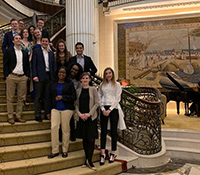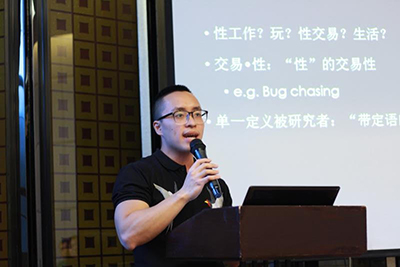Sub Navigation
Congratulations Fellowship & Award Winners!
Rome Prize Awarded to Berhane
 Fiori S. Berhane, a PhD student in Anthropology, won a 2019 Rome Prize in Modern Italian Studies. “This award is an enormous honor and signifies the changing contours of modern Italian studies as Italy continues to confront longstanding questions around race, citizenship, belonging and the legacy of Italian colonialism,” says Berhane.
Fiori S. Berhane, a PhD student in Anthropology, won a 2019 Rome Prize in Modern Italian Studies. “This award is an enormous honor and signifies the changing contours of modern Italian studies as Italy continues to confront longstanding questions around race, citizenship, belonging and the legacy of Italian colonialism,” says Berhane.
Her ethnographic research focuses on the legacies of Italian colonialism and the Italian Communist party in relationship to the Eritrean diaspora in Italy. During her fellowship, she will conduct archival research on the Eritrean People's Liberation Front's (EPLF) relationship to the Italian Communist party. She will also gather oral history interviews with Eritrean women who arrived as early migrants and work primarily in elder care.
“As a cultural anthropologist, my work straddles the social sciences and humanities and to have received this honor at such an early stage of my career is a testament to the academy's belief in my potential as a scholar,” she says.
The Rome Prize is awarded by the American Academy in Rome to individuals who represent the highest standard of excellence in the arts and humanities. Prize recipients receive a stipend, a study or studio, and room and board in Rome, Italy to expand their scholarly pursuits. Learn more.
Haile Selected as Delegate for UAE Foreign Policy Study Tour
 Shanelle Haile, a doctoral student in Sociology, recently took part in a delegation of rising foreign policy professionals on a study tour to the United Arab Emirates. The trip was sponsored by the Embassy of the United Arab Emirates and provided Haile with the opportunity to meet high-level government officials, corporate leaders, academics and cultural ambassadors, and to gain a better understanding of economic growth and development in the Middle East.
Shanelle Haile, a doctoral student in Sociology, recently took part in a delegation of rising foreign policy professionals on a study tour to the United Arab Emirates. The trip was sponsored by the Embassy of the United Arab Emirates and provided Haile with the opportunity to meet high-level government officials, corporate leaders, academics and cultural ambassadors, and to gain a better understanding of economic growth and development in the Middle East.
“This study tour was valuable to my understanding of these topics in that it provided an immersive experience in the political, economic, and cultural characteristics of the UAE and their approach to addressing development challenges,” says Haile.
Haile’s research interests are transnational in perspective and include socioeconomic inequality, social policy, and economic development. She found the opportunity to connect with other young policy researchers and professionals with similar interests to be valuable.
 Tour participants are selected based on a formal application process through the Young Professionals in Foreign Policy organization. Haile was one of twelve selected from over 300 applicants. The study tour is an initiative that brings young professionals to the UAE to develop a deeper understanding of the Middle East and to engage with thought leaders and peers in the UAE to exchange views on how rising leaders can work together to develop more innovative solutions to global challenges.
Tour participants are selected based on a formal application process through the Young Professionals in Foreign Policy organization. Haile was one of twelve selected from over 300 applicants. The study tour is an initiative that brings young professionals to the UAE to develop a deeper understanding of the Middle East and to engage with thought leaders and peers in the UAE to exchange views on how rising leaders can work together to develop more innovative solutions to global challenges.
Cai Wins China Initiative Dissertation Research Award
 Yifeng Troy Cai, a PhD student in Anthropology, received an inaugural China Initiative Graduate Research Award. Together with other pending grants, this award will fund a year of Cai’s ethnographic research on contemporary China's digital infrastructure. He will explore how smartphone apps utilize geolocative technologies and what is status quo in China's post-socialist era. He examines these through the lens of Chinese urban gay populations' intimate relations, health, monetary exchange relations, and LGBTQ activism.
Yifeng Troy Cai, a PhD student in Anthropology, received an inaugural China Initiative Graduate Research Award. Together with other pending grants, this award will fund a year of Cai’s ethnographic research on contemporary China's digital infrastructure. He will explore how smartphone apps utilize geolocative technologies and what is status quo in China's post-socialist era. He examines these through the lens of Chinese urban gay populations' intimate relations, health, monetary exchange relations, and LGBTQ activism.
“This award recognizes a continued support and recognition for my effort to understand larger social issues concerning politics, economics, and infrastructure, through the seemingly mundane, and even unorthodox, intimate life of China’s gay population,” says Cai.
The China Initiative’s Graduate Research Awards support research by doctoral candidates whose focus of study is China. Students may use them to complete archival, library, and on-site field research in Mainland China or Taiwan. The award is administered by The Watson Institute for International and Public Affairs.
Kilpatrick Awarded Inaugural Exoplanet Prize Fellowship
 PhD candidate Brian Kilpatrick has been awarded the inaugural Exoplanet Science Prize Fellowship at the Space Telescope Science Institute (STScI). “Being awarded this fellowship gives me the opportunity to pursue my research goals independently while in an environment where there is a breadth of knowledge to support me,” says Kilpatrick.
PhD candidate Brian Kilpatrick has been awarded the inaugural Exoplanet Science Prize Fellowship at the Space Telescope Science Institute (STScI). “Being awarded this fellowship gives me the opportunity to pursue my research goals independently while in an environment where there is a breadth of knowledge to support me,” says Kilpatrick.
Kilpatrick had the opportunity to collaborate extensively with several researchers at STScI during his graduate career and is excited to join them full time. STScI is the operations center for the James Webb Space Telescope, which is currently scheduled to launch in 2021. He is excited for the opportunity to become uniquely familiar with the instruments and capabilities of the telescope prior to its mission.
His work will focus on bridging theory and observations across multiple techniques. Kilpatrick plans to develop a comprehensive data interpretation framework to synergistically provide a three-dimensional view of atmospheric chemistry and structure.
The Exoplanet Science Fellowship provides up to three years of support at STScI for outstanding postdoctoral researchers working on innovative scientific studies in any area of exoplanet research.
Lomax and Park Win DIAP Awards
 Doctoral students Jeremy Lomax (Ecological & Evolutionary Biology) and Tina Park (Sociology) have won DIAP Awards from the Office of Institutional Equity and Diversity. These awards recognize students, staff, and faculty as well as an administrative and an academic department that used the DIAP as a vehicle to actively create positive change within the university community.
Doctoral students Jeremy Lomax (Ecological & Evolutionary Biology) and Tina Park (Sociology) have won DIAP Awards from the Office of Institutional Equity and Diversity. These awards recognize students, staff, and faculty as well as an administrative and an academic department that used the DIAP as a vehicle to actively create positive change within the university community.
Park shares the following: “the award is an affirmation that the work we do to build community and care for one another in challenging academic institutions is an important one. I hope that the award is a signal to others that the time and energy you spend to make this campus reflective of our diverse communities, and one that is inclusive and equitable, is valued and seen, and to keep the work going.”